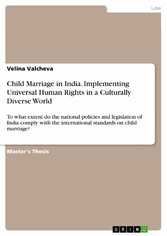Suchen und Finden
Child Marriage in India. Implementing Universal Human Rights in a Culturally Diverse World - To what extent do the national policies and legislation of India comply with the international standards on child marriage?
Mehr zum Inhalt

Child Marriage in India. Implementing Universal Human Rights in a Culturally Diverse World - To what extent do the national policies and legislation of India comply with the international standards on child marriage?
Master's Thesis from the year 2017 in the subject Law - Public Law / Miscellaneous, grade: 2.0-2.2, University of Groningen, course: International Human Rights Law, language: English, abstract: Child marriage is a global concern that is neither a new phenomenon nor a sporadic event. Notwithstanding their recognition by the International Community as a human rights violation, the large scale at which such practices are happening all over the world is more than merely disturbing. The issue is further complicated by the fact that child marriage is often justified by communities' customs or religion. Thus, the cultural sensitiveness that is required when implementing human rights standards could be and has often been employed by states to circumvent their legal obligations related to eradication of the practice by interpreting and applying the laws in a manner which although being in synchrony with one's traditions or religious peculiarities is contrary to such fundamental principles as is the one of the best interest of the child. This thesis analyses India's compliance with international human rights standards on child marriage found in UN instruments and recommendations. It endeavours to evaluate how far the state has come in adopting relevant policies and legislation, are they efficient and to what degree are they being actually implemented. It further identifies relevant social patterns that may affect the efforts towards child marriage eradication and suggests possible paths for changing the status quo. The rationale behind selecting India as a focal point of the research was the contradictory reality of child marriage prevalence despite the evidence of a governmental commitment to its eradication made at a global, regional, and national level. The thesis concludes that although India has made a great progress in terms of adoption of legislative and other measures, due to the ineffectiveness and week enforcement of the latter, the State fails to comply fully with its commitments under the respective international human rights treaties it is a party to.
Alle Preise verstehen sich inklusive der gesetzlichen MwSt.






